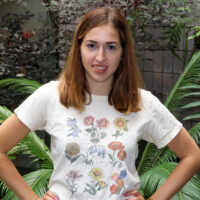
Mechanisms of underlying interactions between herbivores
This research project aimed to explore the preference of squash bugs (Anasa tristis) for cucumber beetle (Acalymma vittatum)-damaged plants and investigate the underlying facilitation mechanisms. The study focused on the impact of plant damage on squash bug nymph growth by analyzing induced leaves’ trichome density as well as leaf phytochemistry, specifically looking at cucurbitacins and jasmonic acid, as well as the leaf hardness in both control and treatment groups. The results revealed intriguing findings, with a particular emphasis on the potential role of leaf hardness in enhancing squash bug performance. Microscopes were utilized to analyze trichomes, high-performance liquid chromatography (HPLC) to evaluate chemical profiles, and a penetrometer for measuring leaf hardness. The insights gained from understanding these preferences contribute to our understanding of how squash bugs exploit plant cues and how plants indirectly facilitate their performance through interactions with cucumber beetles.
During my internship, I was introduced to the captivating field of chemical ecology, which broadened my horizons beyond entomology and plant science. Helping out with another undergraduate’s project, I was also introduced to a six-arm and Y-tube olfactometer, I had the opportunity to explore the fascinating olfactory preferences of squash bugs and their intriguing attraction to the cucumber beetle mating pheromone, vittatalactone. What I found particularly delightful about this experience was how chemical ecology isn’t limited to just the world of insects or plants; rather, it is a complex and interdisciplinary field that intertwines with various other aspects of life. This realization opened my eyes to the diverse ways in which chemical cues influence interactions among organisms and ecosystems, sparking my curiosity to explore even further. My internship not only enriched my knowledge of chemical ecology but also allowed me to gain valuable insights into research methodologies and experimental techniques. It was a rewarding experience and encouraged me to look for more research opportunities in the future!
